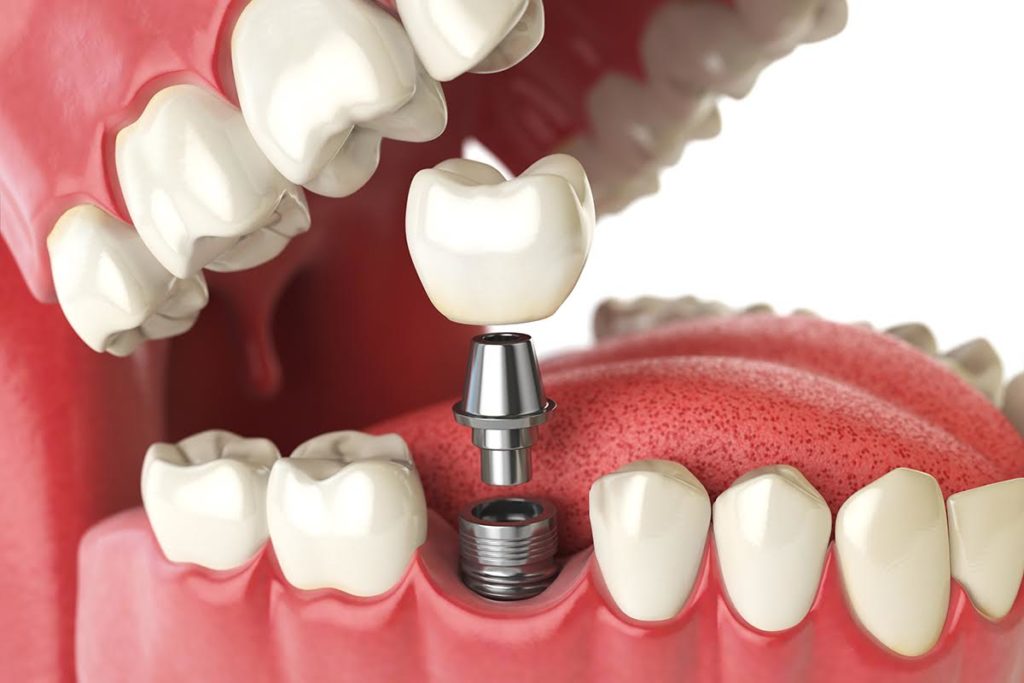Dental Implants
Replacing teeth with dental implants
Usually, when you lose a tooth, it is best for your oral health to have it replaced. Missing teeth can affect your “bite” as well as your ability to speak and chew. Their loss can increase the burden on your remaining teeth and can cause muscle pain in your jaws and headaches. And of course, losing a tooth can affect your appearance.
Replacing a single tooth
Single-tooth implants can be used in people who are missing one or more teeth. An implant is surgically placed in an opening that your dentist makes in the jawbone. After the implant attaches to your bone, it acts as a new “root” for the crown that will replace your missing tooth. A crown (cap), which is made to look like a natural tooth, is attached to the implant and fills the space left in the mouth by the missing tooth.
What if I am missing all my lower teeth?
Ball attachment denture
One option is to have two implants placed in your lower jaw and a denture made that snaps onto these implants. This option allows your lower denture to be more stable while chewing than without implants. However, there will still be movement of your lower denture, and sore spots will occur if any food particles, especially seeds, are caught under it. As with all removable replacement teeth, you still will need periodic appointments for denture adjustment.
Bar attachment denture
Another option involves placing four to six implants, depending on your jaw size or shape, into your lower jaw. After healing is complete, the implants are connected with a custom-made support bar. Your denture will be made with special internal retention clips that attach onto the support bar, enabling the denture to snap firmly into place. This is called an “overdenture.” The advantage of this option is that it is much more stable than the first option and allows very little denture movement. Your denture is still removable for easy cleaning and maintenance.
Screw retained denture
A third option involves placing five or more implants in your jaw and attaching a permanent denture. Your denture is held in place by screws or clasps that secure it to the support posts or bar. It doesn’t touch the gum tissue, which allows you to clean under the denture without removing it. This denture will replace all your missing lower teeth and will not be removed except at maintenance visits. Although cleaning under your denture without removing it is more time consuming and requires more dexterity, many patients who want a permanent denture prefer this option.
What if I’m missing all of my upper teeth?
A similar range of treatment options is also available for your upper jaw. However, because the bone is not as hard as that in the lower jaw, people often need more implants to support their new replacement teeth. Depending upon the number of implants to be placed, it may be possible to eliminate the need for covering the roof of your mouth with a complete denture. This option allows you to fully taste your food and gives you a better sense of its temperature. Your denture will feel more natural. You will still have a removable denture, which makes cleaning the support bar and denture much easier.
Implant retained upper denture
Depending upon the number of implants to be placed, it may be possible to eliminate the need for covering the roof of your mouth with a complete denture. This option allows you to fully taste your food and gives you a better sense of its temperature. Your denture will feel more natural. You will still have a removable denture, which makes cleaning the support bar and denture much easier.
The benefits of dental implants
- Improved confidence
- Stability during eating
- Bone and gum preservation
- Improved dental hygiene
- Superior esthetics
- Nutritional benefits
Common Questions
Do I need dental implants?
If you are missing a tooth or more than one tooth, you may need dental implants. Implants can protect you from bone loss at the location of the missing tooth. Talk to your Advanced Indiana Dental Care team about your options and to see if implants are right for you.
What is the success rate of dental implants?
Dental implants generally have a 98% success rate. But the success of dental implants depends on the placement within the jaw. With proper care, dental implants can last for a lifetime.
Does dental insurance cover implants?
Whether or not insurance will cover your dental implants will depend on your unique situation. Because getting implants is usually a cosmetic procedure, it is generally not covered. In some cases, your implants may qualify for insurance coverage.

Request an Appointment
We want to see your best smile. Become part of the Advanced Dental Care family by scheduling your appointment today!
